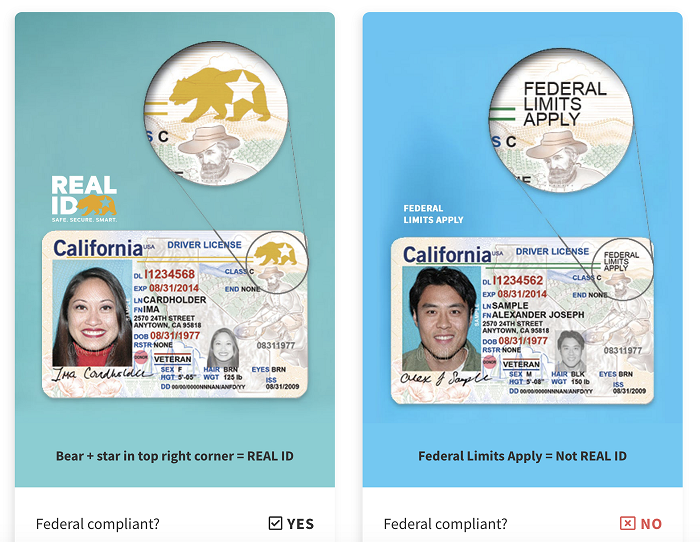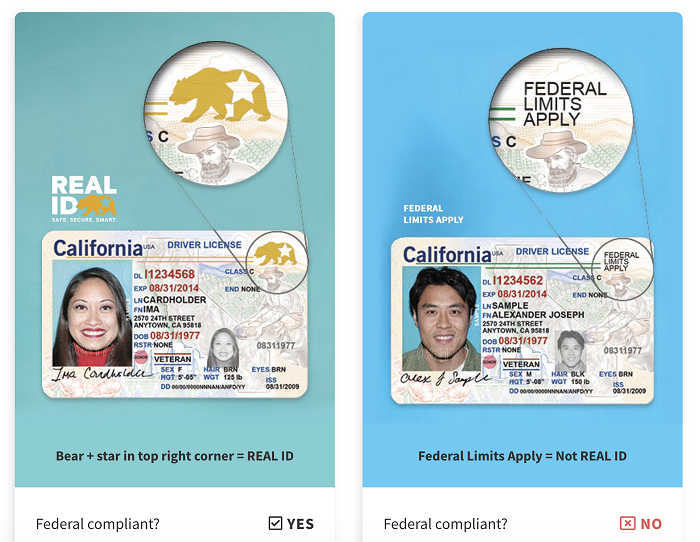

The good news here is that now, travelers who have not gotten documentation that is compliant now have more time to do so – and we know there are a lot of those travelers still out there.
In fact, according to a study conducted by Longwoods International and commissioned by the U.S. Travel Association, the majority of frequent travelers still haven’t signed up to get their new identification card. CBS News notes that according to a summary of the study’s findings, an estimated 72 percent of Americans either don't currently have a REAL ID or they aren't sure if their license is one or not.
And that study was done in the fall of 2019, before COVID was even a blip on the radar.
Once the Real ID Act goes into effect, updated cards will be required for airport check-in and to enter federal facilities.
According to The Points Guy, enacting the Real ID Act is something states are working on gradually as individuals renew their driver’s license. In order to obtain a Real ID, some states may require a social security card and/or a birth certificate, plus some other form of ID such as an unexpired passport, when renewing a driver’s license. (Individuals will also need, most likely, to show up at their local DMV in person – something else that is delaying the enactment).
Unfortunately the process of becoming compliant takes time and it has been slowed by the pandemic, with many state agencies operating at limited capacity and some requiring advance reservations in order to renew a driver’s license. All 50 U.S. states, along with Puerto Rico, the U.S. Virgin Islands, Guam and the Northern Mariana Islands are issuing compliant IDs as people renew (provided they have the correct documentation). The Real ID Act was passed following a recommendation from the 9/11 Commission.
For now, older IDs will be acceptable, allowing people to drive, buy liquor or other age-regulated products and to gamble at casinos. Travelers also can use military IDs or passports to access flights and federal facilities.
With the delayed rollout, it is hoped that more people will be able to get a new enhanced license. (The TSA image accompanying this article shows the difference between compliant and non-compliant licenses).
While there are multiple services that promise to “expedite” getting a passport or other information (for a cost), the Internet seems, for now, blessedly free of scammers promising to ‘assist’ with the Real ID Act (although it is likely this will not last).
Unfortunately, the overwhelming majority of Americans who do not have Real ID-compliant documentation, could (once it goes into effect) be denied the ability to get through TSA, much less board an aircraft.
And that, says US Travel, adds up to about 99 million American who may be unable to get through TSA much less board an aircraft.
That sucking sound you just heard was about a million event owners gasping in horror, thinking of what might happen to tournaments in the future if families are stranded and unable to participate.
Fortunately, thanks to the pandemic (for once), there is time to continue raising awareness. A number of resources are available. In fact, when publicizing events for this fall and beyond, it behooves event owners to add special verbiage, stating, “(X Tournament) is looking forward to your participation, both this year and in years to come. Because we are, we want to make sure everyone is compliant with the REAL ID Act, which goes into effect in May of 2023, and will require special documentation to travel aboard any airline. Click here for more information.”
The “click here” could then help parents and athletes navigate over to resources that can help them become REAL ID compliant in plenty of time for next year’s deadline. For example:
- TSA has set up this special page with Frequently Asked Questions about REAL ID, how it works and where it is necessary. Event owners who want to raise awareness should alert event owners to this page, which has clear and succinct information.
- Individuals who need to apply for a passport should be advised to use this link, rather than those in pages sponsored by travel agencies and other entities, which could charge an additional fee for services.
- Every state’s Motor Vehicle Administration or Department of Motor Vehicles website has information regarding the documentation necessary to have driver’s licenses upgraded to REAL ID. However, it’s worth noting that such websites may be confusing – and that it’s worth talking to a customer service agent prior to heading over to renew or upgrade a driver’s license, since some may require rather extensive documentation in order to get the REAL ID-compliant license, and some may require that reservations be made in advance.
Youth sports event owners should know that those under the age of 18 will not need to be REAL ID compliant in order to fly on or after May 3, 2023, when traveling with an adult companion within the United States. The companion will need REAL ID-compliant identification, as will any family member who will turn 18 during the travel.
Children who are under 16 years old and who are U.S. citizens may travel with their original U.S. birth certificate with the raised seal. Children who are 16 and older, and are U.S. citizens, are required to travel with photo ID. The photo ID can be a passport, or their original U.S. birth certificate with the raised seal plus a government-issued photo ID.
Those traveling with an infant as a lap child will be asked for proof of age, such as a passport, birth certificate or an immunization record. (and infants between three and 14 days old must also have, in the form of a letter, their doctor's approval to travel.)
All the more reason for event owners and rights holders to encourage families to obtain full REAL ID-compliant documentation for their flights sooner, rather than later.
Want some more useful numbers? U.S. Travel economists estimated the potential economic impact of REAL ID implementation: if REAL ID standards were to be fully enforced immediately, at least 78,500 air travelers could be turned away at TSA checkpoints on the first day, costing the U.S. economy $40.3 million in lost travel-related spending. If that trend sustained for a full week, the figures could grow to more than half a million (549,500) air travelers prevented from boarding planes and $282 million in lost travel spending.
Which is not – after all – what is needed following the disaster that was 2020.

